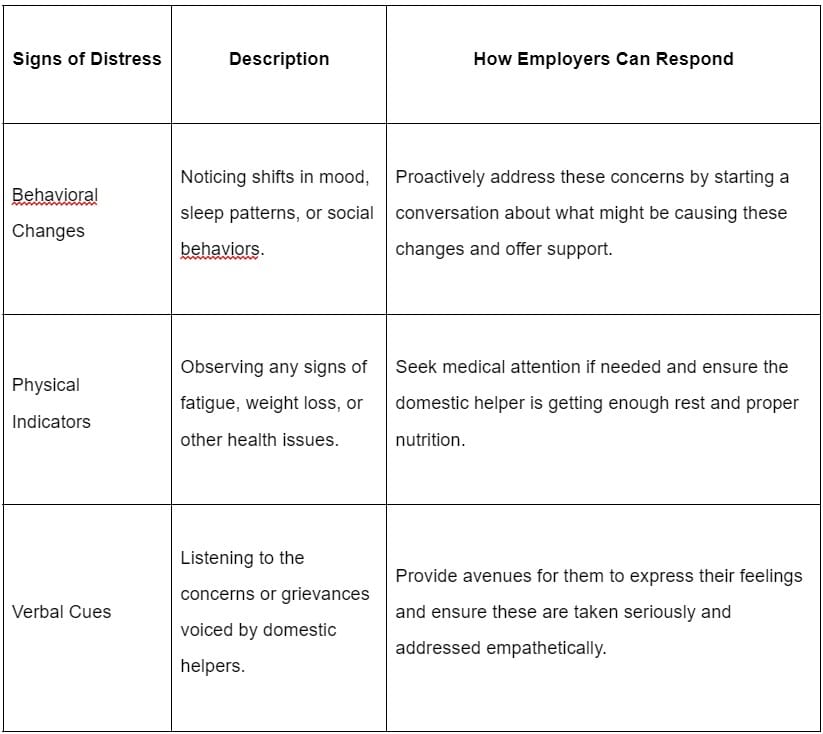
Domestic workers often face unique challenges that can impact both their physical and mental health. The demanding nature of their work, coupled with the emotional strain of working in a foreign environment away from their families, makes them susceptible to a range of health issues.
Understanding these challenges is the first step in creating a supportive and healthy work environment.
Recognizing Signs of Distress in Your Domestic Helper
Domestic helpers often face unique challenges that can impact their mental and physical health.
Being aware of these signs and understanding how to respond appropriately can make a significant difference in their well-being and the overall health of your household. This awareness is a responsibility and an essential aspect of creating a supportive and healthy working environment.
The following table outlines common signs of distress and guidance on how employers can respond effectively and empathetically.

Physical Wellness Issues
Musculoskeletal Injuries: Frequent heavy lifting and repetitive motions can lead to back pain, joint strain, and other musculoskeletal injuries.
Fatigue: Long working hours without adequate rest contribute to chronic fatigue, impacting overall health and work efficiency.
Nutritional Deficiencies: Limited control over diet and meal times can result in nutritional deficiencies, affecting physical health and energy levels.
Work-related Accidents: The nature of domestic work can increase the risk of accidents, such as falls or burns, especially without proper safety measures.
Poor Hygiene Exposure: Handling cleaning chemicals or waste without adequate protection can lead to skin or respiratory issues.
Mental Wellness Issues
Stress and Anxiety: The pressure to meet work expectations and cultural adjustments can lead to heightened levels of stress and anxiety.
Homesickness and Isolation: Being separated from family and familiar social networks often results in feelings of loneliness and homesickness.
Depression: Long-term emotional strain, lack of social support, and isolation can contribute to the development of depression.
Communication Barriers: Language and cultural differences can create communication challenges, adding to stress and misunderstandings.
Trauma from Past Abuse: Some domestic workers may have histories of trauma or abuse, which can impact their mental and emotional well-being.
How Employers can Support their Migrant Domestic Workers
1. Regular Health Check-ups
Regular medical check-ups are paramount for maintaining the health of domestic helpers, especially considering the nature of their work.
Domestic workers often work in close proximity to families, caring for children, the elderly, or individuals with specific health needs. This close interaction necessitates ensuring that they are healthy and free from any communicable diseases to safeguard their own well-being and the health of those they care for.
The Singaporean Ministry of Manpower (MoM) has made it mandatory for maids to undergo medical screenings every six months. These screenings are designed to ensure that domestic helpers are fit for work and do not pose a health risk to those under their care.
Employers should not only comply with these regulations but also view them as an integral part of their responsibility towards their domestic helpers. Facilitating and encouraging these health check-ups, providing the necessary time off, and addressing any health concerns that arise from these screenings demonstrate an employer’s commitment to the well-being of their helper.
This fosters a sense of care and responsibility and contributes to a healthier, more productive working relationship.
2. Health Insurance
Ensuring that domestic helpers have adequate health insurance coverage is an essential aspect of their well-being and a key responsibility of their employers.
In Singapore, the Ministry of Manpower (MoM) has made it mandatory for employers to purchase medical and accident insurance for their domestic helpers. This mandate ensures that these workers have a basic level of protection.
From an employer’s standpoint, insurance provides a safety net that ensures that they are not solely financially responsible for medical emergencies or accidents during employment. It helps mitigate potential costs arising from medical treatments, hospitalizations, or accidents, making it a prudent financial decision.
For domestic helpers, having medical and accident insurance coverage means better access to healthcare services when needed. It ensures that they can receive prompt and adequate medical attention without worrying about the financial burden it may impose.
This access to healthcare provides them with peace of mind, knowing they are covered and protected.
3. Encouraging Healthy Lifestyles
Promoting a healthy lifestyle is crucial to the physical well-being of domestic helpers, and it offers significant benefits for both the helper and the employer. Employers can play a pivotal role in encouraging and facilitating healthier lifestyle choices in several ways.
Providing Nutritious Meals: One of the most direct ways to promote health is through nutrition. This includes accommodating any specific dietary needs or preferences they may have. Given their duties, it’s especially important to ensure that domestic helpers are provided with nutritious, balanced meals to allow them to keep their energy levels up.
Education and Encouragement: Domestic helpers might be unaware of the best practices for maintaining a healthy lifestyle. Employers can offer nutrition, exercise, and general health maintenance guidance and educational resources. This could be informational materials, apps, or even informal discussions about health and wellness.
Encouraging a healthier lifestyle for domestic helpers has numerous benefits. Healthier individuals are generally sick less often, reducing the number of days lost to illness and ensuring consistent support for the household.
Additionally, a healthier lifestyle leads to increased physical strength and energy levels, improving their work efficiency and quality.
4. Mental and Emotional Well-being
Creating an environment where domestic helpers feel comfortable sharing their feelings or concerns is vital for good mental health. This can be done by:
Establishing Regular Check-Ins: Setting aside time for informal conversations where helpers can talk about their experiences and challenges.
Fosteing an Atmosphere of Trust: Building a relationship where domestic helpers feel their concerns will be met with understanding and empathy.
Prompt and Empathetic Responses: When issues are raised, addressing them promptly and empathetically shows that their well-being is a priority.
Allocating Time for Socialising: Ensuring domestic helpers have time off to engage in social activities, helping them maintain a balanced life.
Facilitating Community Engagement: Assisting them in connecting with community groups, cultural associations, or religious institutions that can offer a sense of belonging.
Recognizing Cultural Festivals: Acknowledging and supporting participation in cultural and religious festivals, which are essential for their cultural identity.
Providing Access to Counseling and Therapy: Offering information or assistance in finding counselling or therapy services, especially in cases of severe stress, anxiety, or depression.
Farepro: Providing Quality Domestic Helper Services in Singapore
Migrant domestic workers are among the most vulnerable members of society. Because of this, they require a supportive and understanding environment where their well-being is a priority. As employers, it is essential to recognize this responsibility and take proactive steps to safeguard the health and happiness of these individuals who play such a crucial role in our homes.
Understanding their challenges and providing comprehensive support, from regular health check-ups to emotional and social support, can make a significant difference in their lives. It’s about fulfilling a duty and nurturing a relationship based on mutual respect and care.
At Farepro, we deeply understand these dynamics and the needs of migrant domestic workers. Our services are designed to assist in the hiring process and ensure ongoing support and counsel for maids and their employers.
We believe in creating harmonious relationships where the well-being of domestic helpers is as important as the comfort they provide to households. If you’re looking to hire a domestic helper or need guidance on supporting your current helper, Farepro is here to help.

